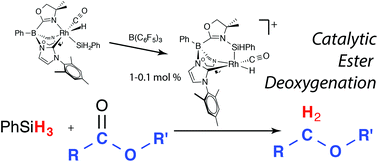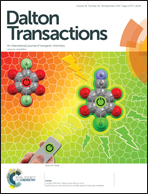Mild partial deoxygenation of esters catalyzed by an oxazolinylborate-coordinated rhodium silylene†
Abstract
An electrophilic, coordinatively unsaturated rhodium complex supported by borate-linked oxazoline, oxazoline-coordinated silylene, and N-heterocyclic carbene donors [{κ3-N,Si,C-PhB(OxMe2)(OxMe2SiHPh)ImMes}Rh(H)CO][HB(C6F5)3] (2, OxMe2 = 4,4-dimethyl-2-oxazoline; ImMes = 1-mesitylimidazole) is synthesized from the neutral rhodium silyl {PhB(OxMe2)2ImMes}RhH(SiH2Ph)CO (1) and B(C6F5)3. The unusual oxazoline-coordinated silylene structure in 2 is proposed to form by rearrangement of an unobserved isomeric cationic rhodium silylene species [{PhB(OxMe2)2ImMes}RhH(SiHPh)CO][HB(C6F5)3] generated by H abstraction. Complex 2 catalyzes reductions of organic carbonyl compounds with silanes to give hydrosilylation products or deoxygenation products. The pathway to these reactions is primarily influenced by the degree of substitution of the organosilane. Reactions with primary silanes give deoxygenation of esters to ethers, amides to amines, and ketones and aldehydes to hydrocarbons, whereas tertiary silanes react to give 1,2-hydrosilylation of the carbonyl functionality. In contrast, the strong Lewis acid B(C6F5)3 catalyzes the complete deoxygenation of carbonyl compounds to hydrocarbons with PhSiH3 as the reducing agent.


 Please wait while we load your content...
Please wait while we load your content...